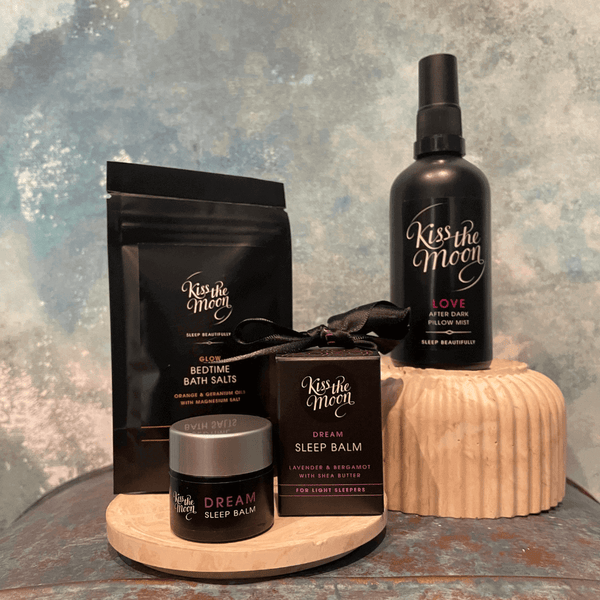EXAM STRESSED? THEN READ ON

Our biggest single tip to help achieve exam success is to prioritise getting a good night’s sleep. When we sleep well, we don’t just feel and look better, but we perform better too. Our brain uses sleep as essential downtime to file memories, get rid of toxins and take some time out to make sense of our waking lives
A good night’s sleep has a positive impact on recall, so it’s pretty crucial to invest in your rest when exam season. However, we all know that is often easier said than done. There are several reasons why sleep is often harder to come by when we’re head down in the middle of revising. Being aware of the reasons behind that is the first step to managing our sleep better through this crucial time in our lives
Six Sleep Stoppers for Exam Students
Stress and Anxiety: The anticipation and pressure surrounding exams can lead to increased stress and anxiety levels. This heightened emotional state can make it difficult to relax and fall asleep.
Cognitive Activation: Your mind may be constantly racing with thoughts about the exam, such as what you need to study, how well you'll perform, or the consequences of failure. This can interfere with the ability to unwind and fall asleep.
Irregular Hours: During exams, your schedule may change because of studying late or for long periods. Irregular sleep schedules can confuse your body's internal clock, making it harder to fall asleep at night.
Physical Discomfort: Sitting for long periods while studying or experiencing tension from stress can lead to physical discomfort such as muscle tension or headaches, which may make it uncomfortable to sleep.
Caffeine and Stimulants: Many students consume caffeinated beverages or stimulants to stay awake and focused while studying. However, consuming these substances close to bedtime can interfere with your ability to fall asleep.
Screen Time: Using electronic devices like computers, tablets, or smartphones too much before bed can make it hard to sleep. The blue light from screens can mess with melatonin, the hormone that helps us sleep.
To improve sleep during exams, focus on self-care and develop good sleep routines. Relieve stress and stress anxiety by creating these habits
Here are ten sleep tips specifically tailored for exam success:
- Stick to a Sleep Schedule: Stick to a consistent sleep schedule during exams. Go to bed and wake up at the same time every day - this includes weekends. Consistency helps regulate your body's internal clock, making it easier to fall asleep and wake up refreshed.
- Prioritise Sleep Quantity: Try to get 7-9 hours of good sleep every night to be well-rested and focused for exams. Skipping sleep for extra study time is not a good idea because it can negatively impact your thinking and memory. This can make it more difficult to perform well on exams..
- Create a Relaxing Bedtime Routine: Create a calming bedtime routine to tell your body it's time to relax. Engage in soothing activities such as reading, taking a warm bath, or doing gentle stretching or yoga. These activities will help you unwind and prepare for sleep.
- Limit Caffeine and Stimulants: Minimize consumption of caffeine and other stimulants, especially in the hours leading up to bedtime. Stimulants can interfere with your ability to fall asleep and may disrupt sleep quality, impacting your readiness for exams the next day.
- Avoid Heavy Meals Before Bed: Avoid eating heavy or spicy food before bed, as it can lead to discomfort and indigestion, making it difficult to sleep. Opt for light, easily digestible snacks if you need to eat something before bed.
- Create a Comfortable Sleep Environment: Optimise your sleep environment to promote restful sleep. Ensure your bedroom is dark, quiet, and cool, and invest in a comfortable mattress and pillows. Use blackout curtains, earplugs, or white noise machines to minimise disruptions and try a Pillow Mist to scent your space.
- Manage Stress and Anxiety: If you feel anxious practice stress-reducing techniques, such as deep breathing exercises, mindfulness meditation, or progressive muscle relaxation, to help you unwind and relax before bedtime. Addressing stress and anxiety can improve sleep quality and overall well-being - our sleep balms can be perfect to help focus and bring down anxiety.
- Limit Screen Time Before Bed: Minimise exposure to screens, such as smartphones, tablets, computers, and TVs, at least an hour before bedtime. The blue light emitted by screens can interfere with melatonin production, making it harder to fall asleep.
- Review Your Day and Plan Ahead: Take some time before bed to review your day, jot down any lingering thoughts or worries, and plan for the following day. This can help clear your mind and alleviate any anxiety or racing thoughts that may interfere with sleep.
- Seek Professional Help if Needed: If you're struggling with negative thoughts, persistent sleep problems or insomnia despite implementing these tips, consider seeking help from a healthcare professional or sleep specialist. They can assess your sleep patterns and provide personalized recommendations or treatments to improve your sleep quality.
Getting enough sleep is important for your overall well-being and academic success. Make sure to prioritise your sleep and follow these tips to improve your exam performance. Remember that adequate sleep is essential for cognitive function, memory retention, and academic success
Want some targeted Kiss the Moon help? In this beautiful bundle we have put together three of our most effective products for helping you handle exam stress and ensure you get a good night's sleep during this exam season
EXAM STRESS BUSTER SET £30 (worth £41) including LOVE After Dark Pillow Mist, GLOW Bedtime Bath Salts & DREAM Sleep Balm
Good luck everyone. Remember you are brilliant.

